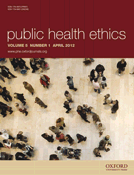-
Views
-
Cite
Cite
Lisa Schwartz, Matthew Hunt, Chris Sinding, Laurie Elit, Lynda Redwood-Campbell, Naomi Adelson, Sonya de Laat, Models for Humanitarian Health Care Ethics, Public Health Ethics, Volume 5, Issue 1, April 2012, Pages 81–90, https://doi.org/10.1093/phe/phs005
Close - Share Icon Share
Abstract
Humanitarian health care practitioners working outside familiar settings, and without familiar supports, encounter ethical challenges both familiar and distinct. The ethical guidance they rely upon ought to reflect this. Using data from empirical studies, we explore the strengths and weaknesses of two ethical models that could serve as resources for understanding ethical challenges in humanitarian health care: clinical ethics and public health ethics. The qualitative interviews demonstrate the degree to which traditional teaching and values of clinical health ethics seem insufficient for addressing all the realities of health care practice during humanitarian missions. They equally suggest that greater good orientations of public health ethics can thwart the best intentions of health care professionals wanting to attend to the interests of individual patients. Even though neither is complete on its own for helping guide health professionals on field missions, taken together these models have much to offer. At the same time, the narratives of the humanitarian health care workers illustrate how some of the crucial differences between public health ethics and clinical ethics generate tensions in humanitarian health practice. We offer an analysis of some of the complexities this creates for humanitarian health care ethics, and consider ways of adjudicating between the two models.



